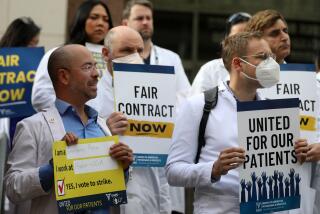Assembly panel may review $4-million retirement package
- Share via
A state Assembly panel next week will consider launching an audit of a public hospital district in Salinas that awarded its retiring chief executive officer nearly $4 million in retirement payments in addition to his regular $150,000-a-year pension.
“I find these excessive benefits unconscionable,” said Assemblyman Luis Alejo (D-Watsonville), who is proposing the audit. “It certainly appears their priorities are all wrong, to give these million-dollar benefits at the expense of patient care.”
Alejo said he has several concerns about the leadership of the Salinas Valley Memorial Healthcare District. The Times reported last week that the district’s board approved a series of supplemental retirement payments to outgoing Chief Executive Officer Samuel Downing. Some experts described the package as one of the more generous public pensions awarded in California.
Downing, who retired last week, earned a base salary of $668,000, along with additional benefits such as a car allowance and paid time off. His 2009 total wages of $790,000 made him one of the best-paid public employees in California, according to the state controller.
In addition to the executive benefits, Alejo asked that the state investigate whether there are any conflicts of interest between the hospital and its elected board members.
Assemblyman Tim Donnelly (R-San Bernardino) of the Joint Legislative Audit Committee said he would “absolutely” support Alejo’s request.
“I think the taxpayers deserve to know how something like this could happen,” Donnelly said.
But a spokeswoman for the hospital district Monday rejected Alejo’s criticism, accusing him of taking allegations made by labor unions about the district’s management at “face value.”
“If Assembly member Alejo had contacted us directly, we would have been happy to clarify the facts for him,” spokeswoman Adrienne Laurent said in a statement. “We know that SVMHS has behaved appropriately, legally and ethically.”
None of the hospital’s five board members responded to interview requests Monday.
The Salinas Valley hospital is one of more than 40 healthcare districts in the state that are public entities receiving public and private funding.
In recent years, the hospital has suffered declining revenues and patient admissions that have forced major cutbacks. About 600 staff positions have been eliminated since January 2010, hospital officials said.
Downing received several increases in his pension between 2006 and 2009, when the hospital created a “post-65” retirement plan exclusively for him. A Times review of other district hospitals found that the executive benefit plan was uncommon because of its value and elaborate design.
Salinas Valley officials defended Downing’s compensation and described him as a skilled, experienced leader. They also said his retirement package was determined through the analysis of an independent consultant.
Downing, 67, gave a lengthy interview to The Times last month, saying that he thought he deserved the pay.
“I think I’ve earned it,” Downing said. “I’ve stayed here out of my commitment to try to build a great hospital.... I worked for this institution and gave them my heart and soul.”
He announced his retirement April 13 and worked his last day Friday. For months, the hospital has been involved in contentious negotiations with unions representing its workers. Labor leaders have been especially critical of Downing and other executives at the hospital.
John Borsos, a vice president at the National Union of Healthcare Workers, expressed support for the audit Monday, saying that the hospital had failed to operate in an open way during the recent negotiations.
“It’s been like pulling teeth to get them to provide the transparency and accountability that a public hospital is required to provide,” Borsos said, adding that he and other union officials believe the hospital misled them when they asked for information on Downing’s pension earlier this year.
More to Read
Get the L.A. Times Politics newsletter
Deeply reported insights into legislation, politics and policy from Sacramento, Washington and beyond. In your inbox three times per week.
You may occasionally receive promotional content from the Los Angeles Times.










